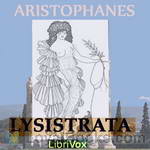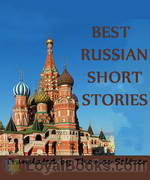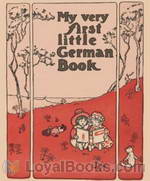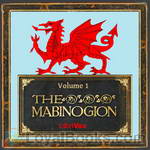|
Books Should Be Free Loyal Books Free Public Domain Audiobooks & eBook Downloads |
|
|
Books Should Be Free Loyal Books Free Public Domain Audiobooks & eBook Downloads |
|
Books on Languages |
|---|
|
Book type:
Sort by:
View by:
|
By: Alexander Pushkin (1799-1837) | |
|---|---|
 Daughter of the Commandant
Daughter of the Commandant
"The Daughter of the Commandant" (better known as "The Captain's Daughter") is a historical novel by the Russian writer Alexander Pushkin, and is considered to be his finest prose work. The novel is a romanticized account of Pugachev's Rebellion in 1773-1774. The 17-year-old Pyotr Andreyich is sent by his father to military service in a remote Russian outpost, where he leans honor and love while being caught up in a violent uprising of tribal groups against the imperial government. | |
By: Ivan S. Turgenev (1818-1883) | |
|---|---|
 Rudin
Rudin
Rudin is the first and perhaps least known novel by Ivan Turgenev, a famous Russian writer best known for his short stories and the novel Fathers and Sons. The story focuses on a romantic involvement between Rudin and Natalya, a serious, intelligent young woman. The topic of the “superfluous man” and his inability to act, which was a major theme of Turgenev's literary work, is explored. – Adapted from https://en.wikipedia.org/wiki/Rudin by Lee Smalley | |
 On the Eve
On the Eve
On the Eve appeared in 1860, two years before Fathers and Sons, Turgenev's most famous novel. It is set in the prior decade (by the end of the novel, the Crimean War (1853-56) has already broken out. It centers on the young Elena Nikolaevna Stakhov, daughter of Nikolai Arteyemvitch and Anna Vassilyevna Stahov. Misunderstood by both her parents (Nikolai Artemyevitch is at least as interested in his German mistress as in members of her family) she is on friendly terms with both the would-be professor Andrei Petrovitch Bersenyev and the rising young sculptor Pavel Yakovitch Shubin, both of whom might be -- or might not be -- in love with her... | |
By: Aristophanes (446BC - 385BC) | |
|---|---|
 Lysistrata
Lysistrata
Lysistrata read by the Classics Drama Company at DePaul. The Classics Drama Company at DePaul is a new gathering of Thespians and Classicists dedicated to performing and understanding ancient literature. If you live in Chicago and attend DePaul University, we welcome new additions to our group. Contact Dr. Kirk Shellko (kshellko@depaul.edu), if interested.First performed in classical Athens c. 411 B.C.E., Aristophanes’ Lysistrata is the original battle of the sexes. One woman, Lysistrata, brings together the women of all Greece, exhorting them to withhold sexual contact from all men in order that they negotiate a treaty... | |
By: George Lovell Cary | |
|---|---|
 An Introduction to the Greek of the New Testament
An Introduction to the Greek of the New Testament
A collection of lessons (primarily in grammar) for New Testament Greek (also known as Koine) collected by a professor at Meadville Theological School of Pennsylvania. There are over 80 short lessons, each covering an aspect of verbs, nouns, etc. | |
By: John Casper Branner | |
|---|---|
 A Brief Grammar of the Portuguese Language
A Brief Grammar of the Portuguese Language
Dr. Branner was a recognized authority on the geology of South American republics, especially Brazil, having organized and headed the Stanford Expedition to Brazil in 1911, among others. In 1910 he published this "little book", as the author himself calls it, for the use of English-speaking students who needed a fast and practical way of learning Portuguese. Contrary to the belief of many back then, John C. Branner claims that Brazilian Portuguese isn't "badly spoken Portuguese", and, even though using examples from both Portuguese and Brazilian writers, seems to give more proeminence to Brazilian Portuguese. | |
By: Alfred Ayres (1826-1902) | |
|---|---|
 The Verbalist
The Verbalist
Ayres arranges usage problems alphabetically and treats certain areas in greater detail as he sees fit. For example, his first entry is A-AN (articles). His second is ABILITY-CAPACITY, in which he distinguishes between the meanings. The alphabetical arrangement continues through to YOURS. (Introduction by Bill Boerst) | |
By: Elias Lönnrot (1802-1884) | |
|---|---|
 Kalevala, The Land of the Heroes (Kirby translation)
Kalevala, The Land of the Heroes (Kirby translation)
The Kalevala is a 19th-century work of epic poetry compiled by Elias Lönnrot from Karelian and Finnish oral folklore and mythology. It is regarded as the national epic of Karelia and Finland and is one of the most significant works of Finnish literature. The Kalevala played an instrumental role in the development of the Finnish national identity, the intensification of Finland's language strife and the growing sense of nationality that ultimately led to Finland's independence from Russia in 1917... | |
By: Hesiod | |
|---|---|
 Works and Days, The Theogony, and The Shield of Heracles
Works and Days, The Theogony, and The Shield of Heracles
Works and Days provides advice on agrarian matters and personal conduct. The Theogony explains the ancestry of the gods. The Shield of Heracles is the adventure of Heracles accepting an enemy's challenge to fight. | |
By: Leonid Nikolayevich Andreyev (1871-1919) | |
|---|---|
 Man Who Found the Truth
Man Who Found the Truth
An old man, accused of having murdered his family as a young man, spends a lifetime in prison. With brilliant psychological insight so characteristic of Leonid Andreyev's work, we follow this man telling his story about his obsession with truth and lies and his religion of the iron grate, tinged with madness, and not necessarily reliable.. | |
By: Pliny the Younger (61 - ca. 112) | |
|---|---|
 Letters of Pliny
Letters of Pliny
The largest surviving body of Pliny's work is his Epistulae (Letters), a series of personal missives directed to his friends, associates and the Emperor Trajan. These letters are a unique testimony of Roman administrative history and everyday life in the 1st century CE. Especially noteworthy among the letters are two in which he describes the eruption of Mount Vesuvius in August 79, during which his uncle Pliny the Elder died (65 and 66 in this edition), and one in which he asks the Emperor for instructions regarding official policy concerning Christians (Trajan Letter 97)... | |
By: Apollonius Rhodius (3rd Cent. -3rd Cent.) | |
|---|---|
 Argonautica
Argonautica
The story of how Jason and a group of famous heroes of Greece took to sea in the Argos has been told many times, before and after Apollonius of Rhodes, wrote his Argonautica, in the 3rd century b.C.. It is not only the oldest full version of the tale to arrive to our days, but also the only extant example of Hellenistic epic. This was already a popular myth by the times of Apollonius, who makes the story of how Jason and the Argonauts sail to Colchis in search of the Golden Fleece, and have to go through a lot of adventures to fulfill their task, a mix of simple narrative and scholarly catalog. The Argonautica had a deep impact on European literature as a whole. | |
By: Robert Wood Williamson | |
|---|---|
 The Mafulu
The Mafulu
The Mafulu, Mountain People of British New GuineaBy Robert W. WilliamsonINTRODUCTION By Dr. A.C. Haddon It is a great pleasure to me to introduce Mr. Williamson's book to the notice of ethnologists and the general public, as I am convinced that it will be read with interest and profit. Perhaps I may be permitted in this place to make a few personal remarks. Mr. Williamson was formerly a solicitor, and always had a great longing to see something of savage life, but it was not till about four years ago that he saw his way to attempting the realisation of this desire by an expedition to Melanesia... | |
By: Mikhail Yurevich Lermontov (1814-1841) | |
|---|---|
 Hero of Our Time
Hero of Our Time
A Hero of Our Time is indeed a portrait, but not of one man. It is a portrait built up of all our generation's vices in full bloom. You will again tell me that a human being cannot be so wicked, and I will reply that if you can believe in the existence of all the villains of tragedy and romance, why wouldn't believe that there was a Pechorin? If you could admire far more terrifying and repulsive types, why aren't you more merciful to this character, even if it is fictitious? Isn't it because there's more truth in it than you might wish? | |
By: Sarojini Naidu (1879-1949) | |
|---|---|
 Golden Threshold
Golden Threshold
Sarojini Naidu was a remarkable woman. Known as the Nightingale of India, she started writing at the age of thirteen and throughout her life composed several volumes of poetry, writing many poems which are still famous to this day. As well as being a poet, Naidu was an activist and politician, campaigning for Indian independence and became the first Indian woman to attain the post of President of the Indian National Congress. This volume contains the beautiful 'Indian Love-Song', as well as many other moving verses... | |
By: Dandin (6th Century) | |
|---|---|
 Twenty Two Goblins
Twenty Two Goblins
These 22 stories are told by the Goblin to the King Vikram. King Vikram faces many difficulties in bringing the vetala to the tantric. Each time Vikram tries to capture the vetala, it tells a story that ends with a riddle. If Vikram cannot answer the question correctly, the vampire consents to remain in captivity. If the king answers the question correctly, the vampire would escape and return to his tree. In some variations, the king is required to speak if he knows the answer, else his head will burst... | |
By: Various | |
|---|---|
 Best Russian Short Stories
Best Russian Short Stories
In this collection of Russian stories, editor and compiler Thomas Seltzer selects from a range of the best examples of 19th and early 20th century Russian literature. As a survey of famous authors at the height of the powers, as well as some writers who have been unjustly neglected, this anthology is indispensable. | |
By: Anonymous | |
|---|---|
 English as She is Wrote
English as She is Wrote
"...Showing Curious ways in which the English Language may be made to convey Ideas or obscure them." A collection of unintentionally humorous uses of the English language. Sections of the work: How she is wrote by the Inaccurate, By Advertisers and on Sign-boards, For Epitaphs, By Correspondents, By the Effusive, How she can be oddly wrote, and By the Untutored. | |
 My Very First Little German Book
My Very First Little German Book
An adorable picture book with 29 little lessons in German. Learn many simple and useful phrases, such as "How big the sea is!" and "Have you ever been to the farm?" The English parts of the book are read by Kara, and the German parts by Elli. | |
By: Unknown | |
|---|---|
 The Mabinogion
The Mabinogion
Sample a moment of magic realism from the Red Book of Hergest: On one side of the river he saw a flock of white sheep, and on the other a flock of black sheep. And whenever one of the white sheep bleated, one of the black sheep would cross over, and become white; and when one of the black sheep bleated, one of the white sheep would cross over, and become black. Before passing on to the Mabinogion proper, Lady Charlotte Guest devotes Volume I of her compilation of medieval Welsh tales to three brief romances of Arthur’s Court... | |
By: Plato (424/423 BC - 348/347 BC) | |
|---|---|
 Apology
Apology
The Apology of Socrates is Plato's version of the speech given by Socrates as he unsuccessfully defended himself in 399 BC against the charges of "corrupting the young, and by not believing in the gods in whom the city believes, but in other daimonia that are novel" (24b). "Apology" here has its earlier meaning (now usually expressed by the word "apologia") of speaking in defense of a cause or of one's beliefs or actions (from the Ancient Greek ἀπολογία). | |
By: Euripides (480-406 BC) | |
|---|---|
 Medea
Medea
Euripides' tragedy focuses on the disintegration of the relationship between Jason, the hero who captured the Golden Fleece, and Medea, the sorceress who returned with him to Corinth and had two sons with him. As the play opens, Jason plans to marry the daughter of King Creon, and the lovesick Medea plots how to take her revenge. | |
By: Various | |
|---|---|
 Prefaces and Prologues to Famous Books
Prefaces and Prologues to Famous Books
Charles W. Eliot, 21st President of Harvard University, edited this volume of prefaces ... authored by a Who's Who of World Literature: Bacon, Calvin, Caxton, Condell, Copernicus, Dryden, Fielding, Goethe, Heminge, Hugo, Johnson, Knox, Newton, Raleigh, Spenser, Taine, Whitman and Wordsworth. Eliot wrote in his preface to these prefaces, "No part of a book is so intimate as the Preface. Here, after the long labor of the work is over, the author descends from his platform, and speaks with his reader as man to man, disclosing his hopes and fears, seeking sympathy for his difficulties, offering defence or defiance, according to his temper, against the criticisms which he anticipates." | |
By: Gaius Petronius Arbiter | |
|---|---|
 The Satyricon
The Satyricon
Satyricon (or Satyrica) is a Latin work of fiction in a mixture of prose and poetry. It is believed to have been written by Gaius Petronius, though the manuscript tradition identifies the author as a certain Titus Petronius. As with the Metamorphoses of Apuleius, classical scholars often describe it as a "Roman novel", without necessarily implying continuity with the modern literary form.The surviving portions of the text detail the misadventures of the narrator, Encolpius, and his lover, a handsome sixteen-year-old boy named Giton... | |
By: Plato (426-347 BCE) | |
|---|---|
 Meno
Meno
Meno (Ancient Greek: Μένων) is a Socratic dialogue written by Plato. Written in the Socratic dialectic style, it attempts to determine the definition of virtue, or arete, meaning in this case virtue in general, rather than particular virtues, such as justice or temperance. The goal is a common definition that applies equally to all particular virtues. Socrates moves the discussion past the philosophical confusion, or aporia, created by Meno's paradox (aka the learner's paradox) with the introduction of new Platonic ideas: the theory of knowledge as recollection, anamnesis, and in the final lines a movement towards Platonic idealism.. (Introduction by Wikipedia) | |
 Laws
Laws
Νόμοι (Laws) is Plato's final dialogue written after his attempt to advise the tyrant Dionysius II of Syracuse. The dialogue takes place between: an Athenian Stranger (Socrates? A god in human form?); the quiet Lacedaemonian Megillus; and the Cretan Cleinias. The Stranger asks whether humans live to be more effective at waging war or if there is something more important a legislator should seek to achieve. During their pilgrimage Cleinias discloses his role in the establishment of a new colony... | |
By: Plato (Πλάτων) (c. 428 BC - c. 347 BC) | |
|---|---|
 Republic (version 2)
Republic (version 2)
The Republic is a Socratic dialogue written by Plato around 380 BC concerning the definition of justice and the order and character of the just city-state and the just man. It is Plato's best-known work and has proven to be one of the most intellectually and historically influential works of philosophy and political theory. In it, Socrates along with various Athenians and foreigners discuss the meaning of justice and examine whether or not the just man is happier than the unjust man by considering a series of different cities coming into existence "in speech", culminating in a city (Kallipolis) ruled by philosopher-kings; and by examining the nature of existing regimes... | |
 Gorgias
Gorgias
This dialogue brings Socrates face to face with the famous sophist Gorgias and his followers. It is a work likely completed around the time of "Republic" and illuminates many of the spiritual ideas of Plato. The spirituality, as Jowett points out in his wonderful introduction, has many ideas akin to Christianity, but is more generous as it reserves damnation only for the tyrants of the world. Some of the truths of Socrates, as presented by Plato, shine forth in this wonderful work on sophistry and other forms of persuasion or cookery. | |
By: Unknown (427? BC - 347? BC) | |
|---|---|
 Theaetetus
Theaetetus
Theaetetus (Ancient Greek: Θεαίτητος) discusses concepts including perception, true judgment and knowledge. Socrates compares the human mind to a piece of wax and is critical of lawyers who seek only to persuade. | |
By: George F. Dillon (1836-1893) | |
|---|---|
 Song Celestial; Or, Bhagavad-Gîtâ
Song Celestial; Or, Bhagavad-Gîtâ
| |
By: Unknown (427? BC - 347? BC) | |
|---|---|
 Parmenides
Parmenides
Parmenides (Ancient Greek: ΠΑΡΜΕΝΙΔΗΣ) recounts a meeting between Socrates, Zeno and Parmenides. Topics discussed include universals, plurality and the One. | |
By: Confucius 孔子 (551-479 BCE) | |
|---|---|
 Analects of Confucius
Analects of Confucius
The Analects, or Lunyu, also known as the Analects of Confucius, are considered a record of the words and acts of the central Chinese thinker and philosopher Confucius and his disciples, as well as the discussions they held. Written during the Spring and Autumn Period through the Warring States Period (ca. 475 BC - 221 BC), the Analects is the representative work of Confucianism and continues to have a substantial influence on Chinese and East Asian thought and values today. William Jennings was a rector of Grasmere, and late colonial chaplain. He served at St. John's Cathedral in Hong Kong. | |